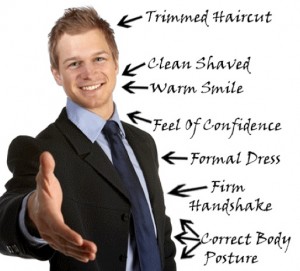Schizophrenia and work: Interview techniques
Without a doubt, for a person living with schizophrenia, getting back into work after a long period “on the sick” will be one of the biggest challenges they will face. And perhaps one of the hardest parts of the back-to-work path is that dreaded job interview. But as with everything else the challenge of the job interview becomes much easier to face if you prepare for it well and take the time to build up some expertise before you take the plunge.
Learning interview skills
Preparation for the job interview begins months before you have even got the interview and involves learning the new skills that you will need to be successful. It will involve diligent research on the internet and in textbooks, watching DVDs and You Tube clips, face-to-face coaching and if possible mock interviews. Your local library and the internet will be valuable sources of help with this.

Mock interviews with one of the back to work organisations like Tomorrow’s People or A4E are a great way to prepare for the real thing. (Image: EDHAR on Shutterstock)
You can do much of this learning at home on your own but we would also recommend finding out about local schemes and organisations that offer interview skills training to people who are out of work. Learning interview skills is not something that can be learned from scratch in a morning. If you have no previous experience of job-searching it will take weeks and months of hard work to get it right.
You also need to spend time working on your self-esteem. Schizophrenia is a ruthless destroyer of self-esteem and it is no wonder that many people with this condition have no confidence in their ability to do a paid job. Remember that if you don’t have any faith in yourself you will find it virtually impossible to sell your qualities at an interview. So now is the time to start to work on improving your self-esteem with a good counsellor.
.
Preparing for the interview
When you hear that you have been given an interview you will understandably be over the moon but be under no illusions, this is when the hard work starts. The preparation that you put into the interview beforehand can win or lose you the job.
1. Research

Your local reference library is a terrific source of information for job searching. (Image: Monkey Business Images on Shutterstock)
Find out as much as you can about the company that is interviewing you. If it’s a large firm then searches on Google or Google News will tell you a lot but don’t stop there. Visit your local reference library and ask the staff there to help you find out more about the company. If it is a small local company then again visit the reference library and try looking in the local press. Don’t be afraid to spend several days on research for an interview.
When you are doing your research try to find out information that will tell you more about what the firm is looking for in its new recruits. For instance will the firm need you to travel or are they looking for people they can train for higher positions?
One of the most frequent questions that interviewers ask is “what do you know about us?” and if you have prepared well this will be your opportunity to impress and show that you are really interested in working for their company.
2. Planning
Be clear about your objective. Remember that essentially the interviewer is looking for someone who can do the job and who will fit in with their existing team of people well. Your job at the interview is to convince him that you can do those two things.
Plan for the day of the interview in detail. Think about:
· How am I going to get there?
· How long will the journey take?
· How much will I need for the fare?
· Will I need to take a packed lunch?
· Will I need to take any documents like proof of identity or school certificates?
· What should I wear?
· What should I take with me?
If there are any negative points in your background such as a diagnosis of serious mental illness, a long time out of work etc then now is the time to prepare what you are going to say about these things if asked by the interviewer. And don’t just prepare your answers and then put them away. Spend time mentally rehearsing how you will discuss these issues with the interviewer.
Also consider some of the more common questions that are asked at interviews and how you will answer them: for instance
· What are your strengths and weaknesses?
· Why did you leave your last job?
· Why do you want to work for this company?
· What have you been doing with your time while you have been unemployed?
· What do you know about our company?
· Why do you want this job?
Always remember that a little mild boasting about your qualities is perfectly acceptable at an interview. You are there to present your abilities, qualities and achievements in a positive light not to beat yourself up.
An interview is the one time when it is acceptable to boast about yourself without being accused of arrogance. Spend some time before the day of the interview practising bragging about yourself either on your own at home or with your friends. Identify achievements in your life that you are really proud of and rehearse how you would tell an interviewer about them.
The day of the interview
Getting there
Make sure you know how to get to the interview. Ensure you have enough cash or cards for your fare and any other expenses like a meal on the way. If the office or works is local then make a trial run there a day or two before to make sure you know where it is and how long the journey will take. If you are travelling some distance it won’t be possible to do that, so instead on the day leave about an hour early to allow for any delays on the way, then when you get there you will have plenty of time to find the address.
If you are running early you can go to Starbucks and get a coffee and run over some of your prepared answers until it is time to go to the interview. Aim to arrive at the interview about ten minutes early. Arriving late will reduce your chances of getting the job considerably.
There is some basic equipment that you will need on the day such as:
· Comb
· Map or directions
· Money or cards for transport
· Umbrella or raincoat
· Your CV
· Notes about the job and the company
It is not a good idea to take your things in an old plastic carrier bag: it won’t impress anyone. If possible take a shoulder bag, despatch bag or small rucksack.
If, on the day, you do find that you are running late for unavoidable reasons make sure you call them to let them know and apologise for being late even if it isn’t your fault.
Make sure you shower or wash on the day of the interview and use a good deodorant. Make sure your hair is recently cut and your clothes are clean and your nails short. Clothes should be pressed the evening before. Men should remove all piercings and women should stick to just ear-rings. Women should make sure their make up is modest and try to find somewhere to spruce it up before going into the interview.
Never ever drink alcohol before an interview, no matter how nervous you are. Going to an interview in drink (and make no mistake it will show) virtually ensures that you won’t get the job. It is also best to avoid drinking the night before.
Always switch off your mobile phone for the interview before you enter the building and don’t switch it back on again until you have left. Never ever make or answer a call on your mobile during an interview.

A successful job interview needs good preparation.
When you enter the office or reception, smile and say hello to the receptionist. Tell them who you are, that you are there for an interview and tell them the name of the person who is interviewing you. These days receptionists are almost always polite and friendly and will put you at your ease; that is their job. However, If they offer you a coffee it is best to decline politely.
Whilst waiting in reception try to make good use of your time. Sometimes companies will leave copies of their company magazine in reception. Use the opportunity to look through these and learn more about the firm. Similarly there may be awards or trophies that the company has won on display there.
During the interview
When your interviewer appears, stand up, smile, make good eye contact and offer them your hand. When you shake hands don’t be too hard or too soft, in between is about right.
In the interview sit up straight and don’t slouch. Don’t call the interviewer by their first name unless and until they invite you to. Remember you are aiming to appear self assured but not too casual.
When the interviewer is speaking show you are listening by nodding, and using phrases like “I see”. If you don’t understand something the interviewer says don’t be afraid to ask him to clarify it.
During the interview watch your language. Never ever use swear words. Words that are perfectly acceptable when you are talking casually with your friends are simply not acceptable in the formal setting of a job interview.
During the interview ask questions about the company. Some useful questions are:
· Is your firm growing at the moment?
· How many people do you employ at this office/works?
· What territory do you cover from this office?
· Who are your major clients?
Everybody wants to present themselves in the best possible light at an interview but never ever tell lies or answer a question with “I’d rather not say”. The interviewer is expecting you to answer all of their questions truthfully and that’s why it is really important to spend time before the interview preparing your answers to awkward questions.
Don’t ask about money, holidays or other benefits: wait until the interviewer raises the subject but do be prepared to answer questions like “what sort of wages were you on at you last place?” or what sort of salary are you looking for at the moment?”
Try to keep the interview positive. Never criticise a previous employer, teacher or lecturer or someone you have worked with. Similarly never offer negative information about yourself but if there are negatives in your CV such as a diagnosis or a long time out of work then be prepared to answer honestly. Part of your preparation for the interview will be to have anticipated these sorts of questions and have good workable answers well prepared in advance. Try to put some positive spin on your answers. Look on questions as an opportunity to tell the interviewer something positive about yourself.
Unless the interviewer raises the subject of expenses assume that they will not be paying travelling expenses for coming to the interview. Most firms don’t, so make sure you have enough money on the day to cover your fares and other expenses.
When the interview is coming to an end the interviewer will usually ask if you have any questions you would like to ask. After that they may begin to signal the end of the interview by closing their pad or looking at their watch. Stand up when they do, smile and offer your hand. Don’t be afraid to tell them that you have enjoyed the interview and would really like to work for their company. It is also perfectly acceptable to ask when you can expect to hear about their decision.
Should you tell the interviewer about your schizophrenia?
If you have had a diagnosis of a serious mental illness like schizophrenia there is no need to mention it on your CV. However if you have had a long time out of work or study because of your illness you may like to refer to something like “a career break due to ill health”.
Very few employers will enquire about your diagnosis during a job interview especially larger firms, however if they see a reference to illness on your CV they may ask what the problem was. You may not want to disclose your diagnosis at this stage since the interviewer may not understand much about schizophrenia. So it may be better to use a term that is more readily understood such as ”I had a breakdown”.
If the employer is interested in taking you on they will then want to refer you to their occupational health consultants who will interview you separately and determine whether you are fit to work in that job. This may involve them contacting your doctor for their opinion of your fitness to work and questions about the medication that you are currently taking.
When you talk to the occupational health consultant you will be speaking to a health professional such as a nurse who will have a much better understanding of your diagnosis than the person who interviewed you and will be able to make a much more considered judgement as to your suitability for the job than say a line manager who may only know about schizophrenia from what he has read in the newspapers.
However the interviewer may ask how your illness affected you and if you are fully recovered. Don’t be daunted by these questions. Questions like these are your opportunity to show the interviewer that you are fully fit to work. Your aim is to reassure him about this aspect of your life and not to leave any lingering doubts in his mind. Remember to anticipate these sorts of questions and have good answers prepared in advance.
Here are a couple of examples of the kinds of things that you could say if asked about your illness. You will probably be able to think of others:
“I saw my doctor a couple of weeks ago and she gave me a clean bill of health and said that I am well fit for work now”.
“I had a breakdown several years ago caused by stress. It was quite a serious breakdown but I have made a very strong recovery and in many ways it has made me into a stronger person than I was before”.
“In the past I have found too much stress difficult to cope with like most people but I have learnt how to cope better now and I tend to manage my stress now so that it doesn’t affect my life so much”.
A word about eye contact
Eye contact is something that many people with schizophrenia often struggle with. However it is a really important part of your communication skills and so it is important that you work at it.
Try to look the interviewer in the eye but don’t stare too hard or too long. If you feel that you are not getting it right then try focussing on the area of their face just below the eyes and above the mouth or looking at their ear.
Don’t be afraid to look away briefly every so often as if you are thinking about something the interviewer has just said. Using nods and listening noises like saying “I see” will help to avoid total “eye lock”.
It is a very good idea to find someone who you can practice eye contact with before the interview such as your community psychiatric nurse or a close friend or relative.
After the interview
A last word: if you do get a rejection letter after putting all your effort into the interview technique don’t worry. Just accept that you win some and you lose some and you won’t be successful every time. But use the experience of the interview to improve your interview technique so that you stand a better chance next time.
Like everything else in life good interview technique doesn’t come naturally; it has to be learnt. The prospect of a job interview will no doubt fill you with apprehension but you can make the whole experience much less stressful and much more likely to succeed if you learn and put into practice some of these simple techniques before you start.
References
1. This article is based on the author’s personal experiences.
Further Reading
There are hundreds of books about interview skills. These are just a couple that we thought of high enough quality to recommend:
1. Innes J, The Interview Book, Pearson
2. Eggert M, Perfect Interview, Random House.
3. James J, You’re Hired: Interview, Trotman Publishing.
4. The Interview Experts, DVD, Cavendish Films







